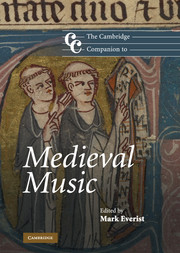Book contents
- Frontmatter
- Introduction
- Part I Repertory, styles and techniques
- Part II Topography
- Part III Themes, topics and trajectories
- 11 Music and liturgy
- 12 Vernacular poetry and music
- 13 Latin poetry and music
- 14 Compositional trajectories
- 15 Ecclesiastical foundations and secular institutions
- 16 Theory and notation
- 17 Music manuscripts
- 18 The geography of medieval music
- 19 Reception
- Notes
- Bibliography
- Index
17 - Music manuscripts
from Part III - Themes, topics and trajectories
Published online by Cambridge University Press: 28 September 2011
- Frontmatter
- Introduction
- Part I Repertory, styles and techniques
- Part II Topography
- Part III Themes, topics and trajectories
- 11 Music and liturgy
- 12 Vernacular poetry and music
- 13 Latin poetry and music
- 14 Compositional trajectories
- 15 Ecclesiastical foundations and secular institutions
- 16 Theory and notation
- 17 Music manuscripts
- 18 The geography of medieval music
- 19 Reception
- Notes
- Bibliography
- Index
Summary
Unless sounds are remembered by man, they perish, for they cannot be written down.
Isidore of SevilleOf all the evidence we rely on to construct the story of the medieval musical past, the manuscript is the most important, but also the most capricious. Not only are the extant sources just a tiny portion of the original bibliographic picture, but they also transmit repertories that were, in Nino Pirrotta's famous characterization, the ‘tip of an iceberg, most of which is submerged and invisible’. Created in a culture sophisticated in practices of memory and improvisation, the written record was one among many technologies for storing music. Moreover, the written record connects to oral practices in numerous ways: notation is a shorthand more than a prescription, assuming the invisible knowledge of a performer. Finally, writers from Isidore of Seville to Ingarden suggest a drastic distinction between inscription and performance: music exists in sound, and writing (on the page, or, in Isidore's case, in the memory) is a representation removed from musical reality.
If music manuscripts are incomplete witnesses to sound, they still have much to tell, particularly when we consider not just what they transmit, but also how they do so. ‘Manuscript’ is a retrospective designation that, as Peter Stallybrass reminds us, is only possible with the advent of print. No mere truism, this distinction emphasizes the technologies and materials of textual production: manuscripts are made by the hand.
- Type
- Chapter
- Information
- The Cambridge Companion to Medieval Music , pp. 291 - 319Publisher: Cambridge University PressPrint publication year: 2011
- 1
- Cited by



